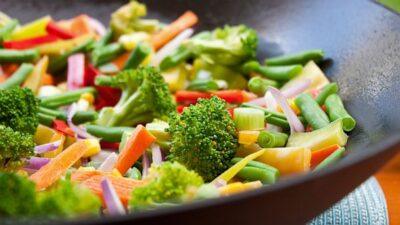 What you eat can relieve your asthma symptoms or lessen flare-ups. Personal experiences and scientific research studies demonstrate that what you eat has major impacts on how well asthma is controlled. A healthy diet can make you feel better, in general. It can prevent complications, such as infections, and improve your energy levels.
What you eat can relieve your asthma symptoms or lessen flare-ups. Personal experiences and scientific research studies demonstrate that what you eat has major impacts on how well asthma is controlled. A healthy diet can make you feel better, in general. It can prevent complications, such as infections, and improve your energy levels.
While there are some general eating practices which benefit most people who have asthma, you must tailor your diet to meet your needs.
Many individuals who have asthma suffer from food allergies. Avoid foods to which you are sensitive or allergic.
If you think that you may be allergic or sensitive to a food group, try eliminating it for a week. Note how you feel. Reintroduce foods within the food group, one at a time. This elimination process may help you to discover what foods make you feel well or ill.
Here is a simple test which you can try at home to determine sensitivity quickly. Take your pulse for one minute. Note the rate. Eat a food in which you are unsure if you are mildly sensitive. Wait 20 to 30 minutes. Recheck your pulse. If your pulse rate has increased by 10 or 20 beats per minute, it is likely that you are sensitive to that food. Eliminate it until further testing can be performed.
You may want to consult with an allergist for testing if you think that you have allergies or sensitivities which you cannot determine on your own, or if you have significant reactions to specific foods or food groups.
Obtain Medical Assistance for Allergic Reactions to Food
Of course, you should seek medical help immediately if you suffer from a severe allergic reaction after consuming any foods. Symptoms of allergic reactions include hives, swelling around the mouth, throat or lips, difficulty breathing, restlessness, nausea and vomiting. If you have any symptoms which impair your ability to breathe, you or someone else should call 911 immediately.
Could This All-Natural ‘Detox’ Capsule Have Extended John Wayne’s Life?
Taking a Look at a Vegan Diet
Many researchers have conducted studies to determine what types of diets are most beneficial for sufferers of asthma. Several studies indicate that a vegan diet may be a particularly healthy option for people who have asthma. Research studies across the globe indicate that rates of infection decrease when people who have asthma eat a vegan diet. Increased endurance and enhanced respiratory health also can accompany this diet.
Vegan diets are rich in fiber. Researchers say this benefits the health of the digestive tract, where much of your immune system is located.
Healthy Benefits of a Vegan Diet
Fresh fruits and vegetables are the best sources of flavonoids, antioxidants and other phytochemicals which reduce inflammation, promote tissue repair, and calm the tissues of your entire body. They are great sources of vitamins and minerals which nourish your entire body. Fruits and veggies do not form excess mucus. They enhance elimination and detoxification of all of the body’s tissues. Most fruits improve lung function and enhance resistance to infection.
Most vegan diets are comprised primarily of simple whole foods. If you primarily use whole foods in your diet instead of processed foods, you eliminate exposure to a multitude of chemical compounds which are known to precipitate asthma and sensitivity reactions. Some of these offenders include preservatives, flavor enhancers, and artificial colorings and sweeteners. Reactions to food additives are minimized.
By eating a vegan diet, you are more likely to maintain a healthy weight which will reduce the workload on your entire body, including your lungs, and improve your ability to fight infections. Your energy levels will increase as well.
New “Survival Herb Bank” Gives You Access to God’s Amazing Medicine Chest
While vegan diets are healthy, I recommend that you take a multi-vitamin, multi-mineral supplement which is designed for vegans if you opt to follow such a diet. The vegan diet is nutritionally excellent; however, vegans may be at risk of deficiency in vitamin B12, which can be obtained via supplementation.
Eat Magnesium-Rich Foods
The mineral magnesium is essential for your body. Adequate amounts of magnesium calm the tissues. Magnesium relieves irritation and inflammation associated with asthma. Include bananas, whole grains, dried peas and beans, molasses, almonds and brown rice in your diet to ensure that you obtain plenty of magnesium.
Honey and Bee Pollen Relieve Allergies
If you suffer from airborne allergies, include some local honey in your diet every day. If there is a local beekeeper nearby, see if you can purchase some bee pollen. Try taking 1 grain of pollen initially, and gradually increase the amount to one half to one teaspoon of bee pollen each day. Do not try this if you are allergic to honey or if your symptoms worsen when you eat the pollen. Local honey and bee pollen can help your body to build up immunity to local allergens which precipitate asthma attacks.
Wild and Simple Foods Support Respiratory Health
Include nettles in your diet regularly. Nettles can mediate allergic responses within your tissues. If your asthma is worse seasonally, begin consuming nettles in your diet as a food or tea every day, starting a couple of months before the time of the year that you normally experience an exacerbation of symptoms.
Eat plenty of horseradish, garlic, onions and shallots. In the spring, harvest and pickle wild leeks if they grow in your locale. All of these plants have been shown to decrease occurrences and the intensity of asthma attacks.
By eating a healthy, simple plant-based diet, you may enjoy better health, fewer symptoms of asthma and increased vitality.
Source:offthegridnews.com

Leave a Reply